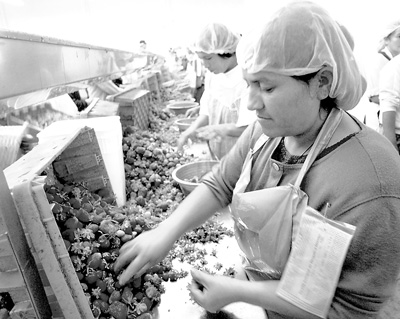
HURON, Calif. (AP) — Weary of waiting for Congress to overhaul the nation’s immigration laws, the United Farm Workers is marching forward with a plan to recruit Mexican laborers to pick crops on U.S. farms.
The union’s efforts to import temporary workers under an existing government program follows similar moves by lawmakers in Arizona and Colorado, who are also trying to create new pathways to bring in foreign field hands without approval from Washington.
Last month, UFW President Arturo Rodriguez signed an agreement with the governor of the Mexican state of Michoacan to help recruit local residents to apply for temporary jobs on U.S. farms, all of which would be covered under union contracts.
Thousands of people from the central Mexican state already harvest strawberries, oranges and other crops in the U.S.
Under the new pact, government field staff in Michoacan will distribute information on U.S. labor protections, especially in rural towns known for sending a large number of their residents north. In exchange, the union will negotiate contracts with U.S. growers willing to guarantee that legal workers’ rights will be respected on both sides of the border, UFW International Director Erik Nicholson said.
The UFW got involved after hearing that Mexican recruiters were charging people as much as $5,000 for short-term contracts under the existing, but rarely used federal guest worker program, Nicholson said.
“Agriculture is a global industry, so we’re building an international infrastructure to advocate for these global workers,’’ Nicholson said. “Workers need to know about their rights on both sides of the border.’’
Immigration raids and employer penalties have led to a shortage of workers in the nation’s largest farm states, leading many in the agriculture industry to conclude that growers can’t get their products to market without a stable supply of workers from abroad.
But with Congress deadlocked over immigration reform, the question is under what conditions the workers will be hired — legally or illegally.
The farm labor force in the U.S. currently numbers about 1.6 million, 70 percent of which is thought to be undocumented, according to people in the industry. Only about 70,000 farm workers were brought in from abroad last year for the short stints permitted under H2-A visas issued by the U.S. Department of Labor.
The UFW wants to increase those numbers by matching willing workers in Mexico with U.S. farmers ready to use the H2-A program. That would in turn help grow the union’s membership, which has been in decline.
The entire guest worker program was nearly gutted last year under a U.S. Senate bill that would have given some recruits a path to citizenship.
The legislation never passed.
Legislators in Arizona are considering a proposal that would let employers recruit workers through Mexican consulates, if they could document they faced a labor shortage. A similar Colorado bill was introduced, aimed at helping chili and watermelon farmers hire foreign staff by eliminating the bottlenecks in the federal program.
Both put the Labor Department in an awkward position, and could be challenged in court, said Leon Sequeira, its assistant secretary for policy.
“I don’t think anybody would object to organizations trying to prevent recruiters from charging workers exorbitant fees,’’ Sequeira said. “But it’s new territory when you are talking about states setting up their own guest worker programs and letting aliens into the country.’’
The federal government is trying to stave off the state-by-state approach by tinkering with its existing guest worker program, and released a set of proposed changes in February.
The department is considering thousands of letters it received about the proposed changes, but expects to implement the new rules by year’s end.
California farmers opposed several of the new provisions, including higher application fees, and say the program still won’t help them get the crews they need to harvest their crops on time.
“Four months out, you may not know how many workers you’ll need. Is it going to be a big crops, or a small crop?’’ said Jack King, the California Farm Bureau Federation’s national affairs manager. “These rules help, but we still have a long way to go.’’
The UFW is critical of the federal fix, too. Making it easier for farmers to import foreign laborers without requiring them to prove they exhausted every avenue for finding workers at home could mean U.S. citizens are more easily passed over for jobs,¨ Nicholson said.
Attorneys with California Rural Legal Assistance have filed a few successful lawsuits against farmers for firing U.S. workers and hiring foreign laborers instead. They also have sued over housing and wage conditions for guest workers themselves.
Simon Sangerman supports his wife and two children picking cauliflower and celery in Huron, about 55 miles from Fresno.
Sangerman, 44, is a permanent U.S. resident, has a green card and more than two decades of experience.
But in March, Tanimura & Antle Fresh Food, Inc., the nation’s largest lettuce grower, laid him and 14 other U.S. workers off at the same time the company tried to bring in a foreign crew, Nicholson said.
The company did not respond to repeated requests for information about a complaint the union filed in March. Sangerman said he was recently hired back temporarily to ready watermelon fields for planting.
“They should have told us they had jobs available in Arizona and in the Imperial Valley, but instead they wanted to bring in the foreign workers,’’ said Sangerman. “I was ready to go there to work, but they never offered us those jobs.’’
Por Garance Burke
Associated Press


